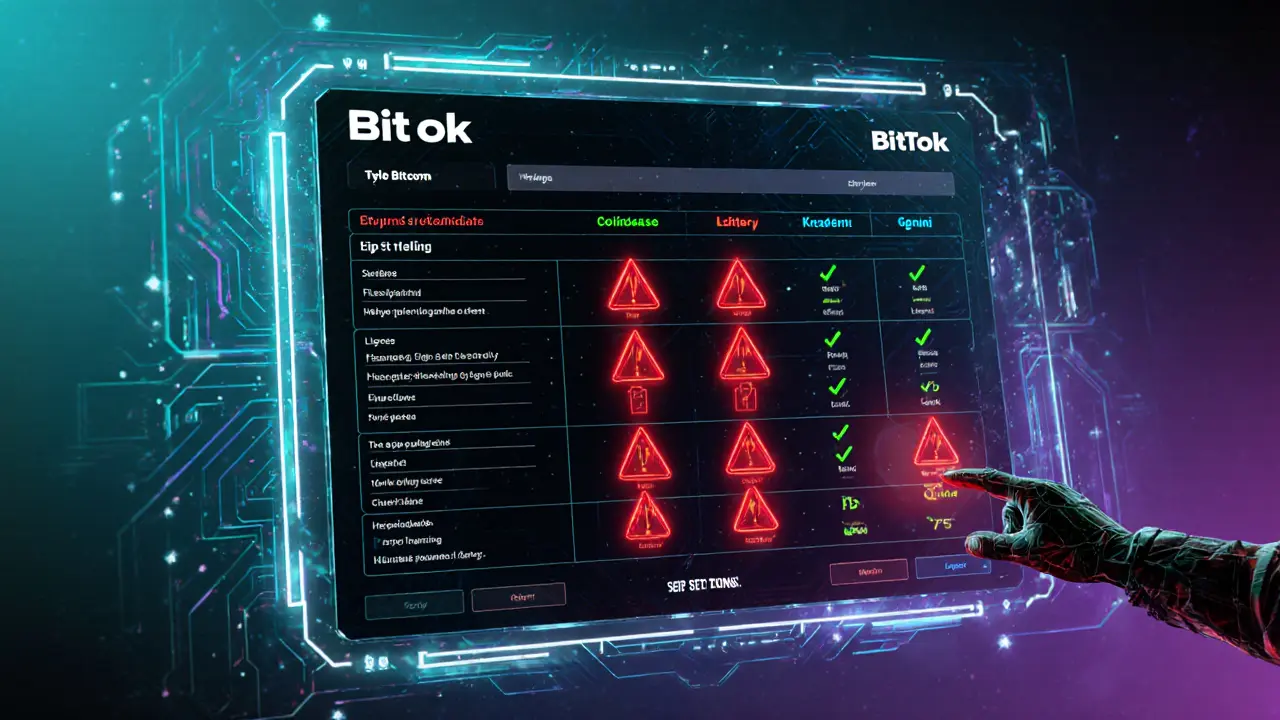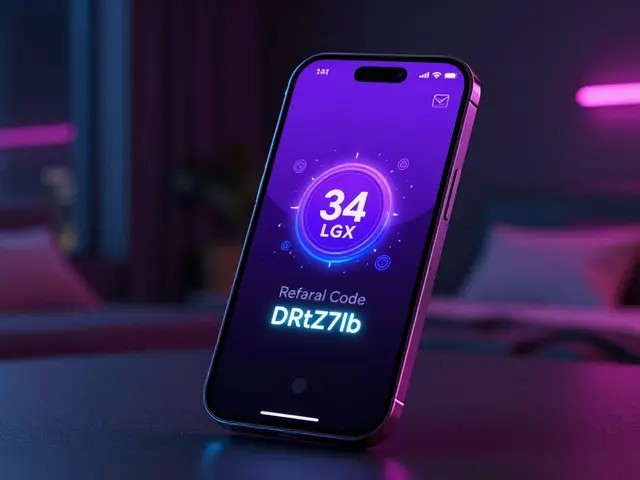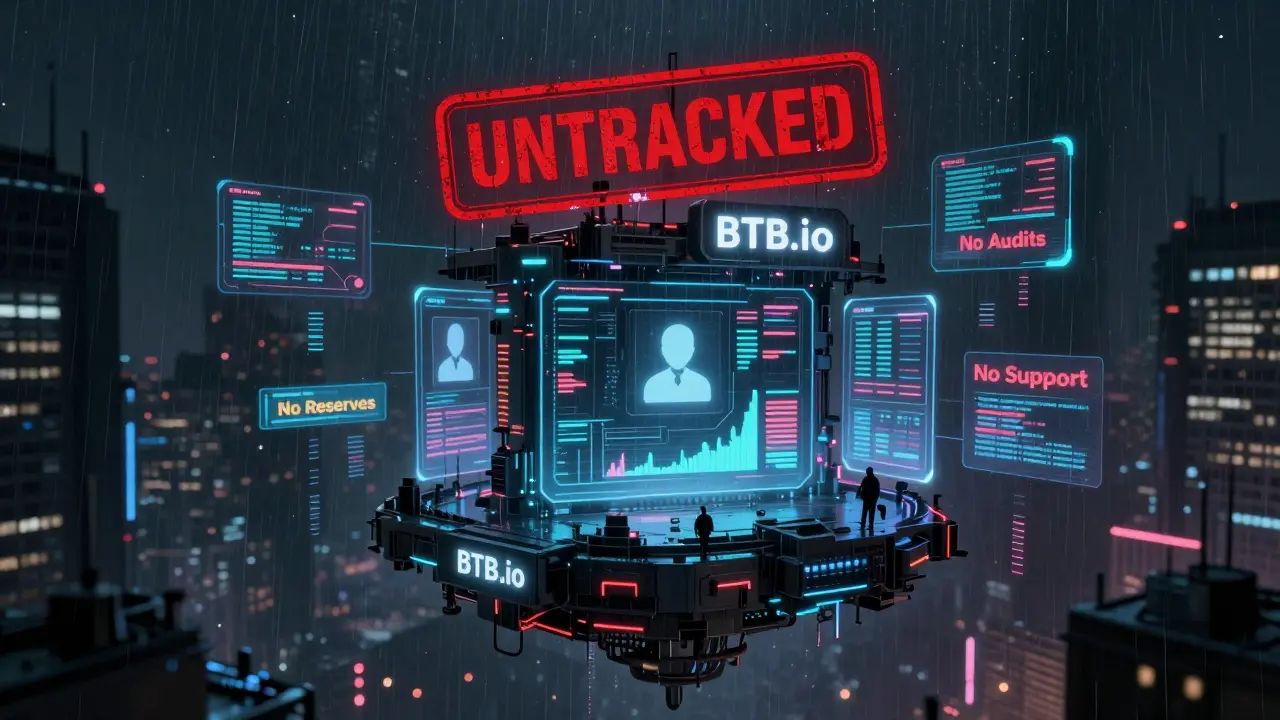BitTok Exchange Risk Assessment Tool
BitTok is a cryptocurrency exchange with limited public information. This tool evaluates its key risk factors based on available data.
Warning: BitTok lacks regulatory licensing, transparent fee structures, and public security audits.
| Feature | BitTok | Crypto.com | Coinbase | Kraken |
|---|---|---|---|---|
| Regulatory License | N/A | MGA, SOC 2 | NYDFS, FCA | FCA, FinCEN |
| Supported Cryptocurrencies | Unknown (claims hundreds) | 350+ | 235 | 350+ |
| Trading Fees (maker/taker) | N/A | 0-0.04% / 0-0.04% | 0-3.99% | 0-0.4% |
| Withdrawal Limits | Not disclosed | Up to $100k/day | Up to $25k/day (verified) | Up to $100k/day |
| Insurance Coverage | None reported | $200M crypto insurance | $250M custodial insurance | None |
| Support Channels | Email only | 24/7 live chat, phone | Email, phone, chat | Email, live chat |
Based on Trustpilot reviews:
- 3.8-star rating from 15 reviews
- Positive mentions: easy onboarding, fast initial withdrawal
- Negative feedback: withdrawal delays after 48 hours, silent customer support
These mixed signals suggest either weak infrastructure or intentional withdrawal restrictions.
For users seeking a safer alternative, consider:
- Crypto.com: Low fees, strong insurance, global compliance
- Kraken: High liquidity, European/U.S. regulatory compliance
- Gemini: U.S. compliance, custodial insurance
If you must test BitTok, follow the safe testing checklist above.
When you search for a BitTok crypto exchange review, the first thing you’ll notice is the scarcity of reliable data. Unlike Coinbase or Binance, BitTok barely shows up on industry‑wide ranking sites, regulatory registries, or user‑feedback forums. This article pulls together every verifiable piece of information, compares BitTok to the heavy‑hit exchanges of 2025, and outlines the red flags you should watch for before committing any funds.
TL;DR
- BitTok’s public footprint is tiny: 3.8/5 Trustpilot score from 15 reviews, no presence on CoinGecko, CoinMarketCap, or major regulator lists.
- Key data points-fees, supported assets, security audits-are unavailable, making risk assessment difficult.
- Established platforms (Crypto.com, Coinbase, Kraken) offer transparent fee schedules, insurance, and regulatory licensing.
- If you decide to try BitTok, start with a minimal deposit, verify withdrawal capability, and keep an eye on customer‑support responsiveness.
- Consider the alternatives: Crypto.com (low fees), Kraken (high liquidity), Gemini (U.S. compliance), or Binance US (broad asset coverage).
What Is BitTok?
BitTok is a cryptocurrency exchange platform that claims to allow users to trade a variety of digital assets. The only publicly visible metric comes from Trustpilot, where a profile listed as Bitok.me shows a 3.8‑star rating based on 15 reviews as of September152025. Whether BitTok and Bitok.me are the same service remains unverified.
Beyond this snippet, the exchange does not appear on CoinGecko’s exchange ranking, nor does it have a profile on CoinMarketCap. No regulatory licensing information (e.g., FINRA, FCA, or local crypto‑business permits) can be located, and there are no published security audit reports.
Why Transparency Matters in 2025
Regulators such as the California Department of Financial Protection and Innovation maintain a public scam‑tracker that lists dozens of crypto platforms that disappear after locking user withdrawals. Transparency-public licensing, third‑party security audits, clear fee tables, and active community discussions-acts as the first line of defense against these scams.
Established exchanges publish their compliance status. For example, Crypto.com holds a Malta Gaming Authority (MGA) license, offers a $200million crypto insurance policy, and discloses a zero‑fee crypto‑to‑crypto trading model for most pairs. In contrast, BitTok provides none of these assurances.
BitTok vs. the Market Leaders (2025)
| Feature | BitTok | Crypto.com | Coinbase | Kraken | Binance US | Gemini |
|---|---|---|---|---|---|---|
| Regulatory license | N/A | MGA, SOC 2 | NYDFS, FCA | FCA, FinCEN | FinCEN, State‑by‑State | NYDFS, FINRA |
| Supported cryptocurrencies | Unknown (claims “hundreds”) | 350+ | 235 | 350+ | 158 | 73 |
| Trading fees (maker/taker) | N/A | 0‑0.04% (maker) / 0‑0.04% (taker) | 0‑3.99% | 0‑0.4% | 0‑0.6% | 0.5‑3.49% |
| Withdrawal limits | Not disclosed | Variable, up to $100k/day | Up to $25k/day (verified) | Up to $100k/day | Up to $50k/day | Up to $50k/day |
| Insurance coverage | None reported | $200M crypto insurance | $250M custodial insurance | None | None | $200M custodial insurance |
| Customer‑support channels | Email only (response time unclear) | 24/7 live chat, phone | Email, phone, chat | Email, live chat | Email, chat | Email, phone, chat |
What the table shows is that every major platform publishes core data-fees, licensing, insurance-while BitTok leaves those rows blank. Blank fields are a warning sign, not a neutral “no charge” statement.

User Feedback: The Trustpilot Snapshot
Trustpilot remains the sole public source of user sentiment for BitTok. The 3.8‑star rating stems from fifteen reviews that mention “easy onboarding” and “fast initial withdrawal,” but also flag “withdrawal delays after 48hours” and “customer‑service silence.” Those mixed signals are typical of platforms that either lack robust infrastructure or deliberately limit withdrawals after building user trust.
In contrast, Crypto.com’s Trustpilot score sits at 4.5/5 from over 30,000 reviews, with a recurring theme of “quick payouts” and “responsive support.” The volume difference alone suggests a higher degree of market validation for Crypto.com.
Red Flags Specific to BitTok
- Absence from major exchange rankings: No listing on CoinGecko, CoinMarketCap, or CryptoCompare.
- Lack of licensing information: Neither the U.S. Financial Crimes Enforcement Network (FinCEN) nor any European regulator publicly acknowledges BitTok.
- Unclear fee structure: Users cannot calculate cost of trade before depositing funds.
- Limited customer‑support channels: Only email is advertised, with no guarantee of response time.
- Withdrawal uncertainty: Trustpilot reviews mention delays and occasional outright blocks.
How to Safely Test a Little‑Known Exchange
If you’re still curious about BitTok, follow this risk‑mitigation checklist:
- Create a fresh email address solely for crypto interactions.
- Deposit the smallest amount you can afford to lose (e.g., $50).
- Attempt a withdrawal to a separate wallet within 24hours. Document the response time.
- Check the exchange’s SSL certificate expiration and domain registration age (use a WHOIS lookup).
- Search Reddit or specialized forums for any user‑generated warning threads.
If any step raises doubts-slow support reply, unexpected fees, or missing withdrawal confirmation-stop using the platform immediately.
Alternatives Worth Considering
Based on the 2025 landscape, here are three platforms that cover most use‑cases BitTok claims to support:
- Crypto.com: Best for low‑fee, crypto‑to‑crypto trades and built‑in insurance.
- Kraken: Highest liquidity, strong regulatory compliance in Europe and the U.S.
- Gemini: Ideal for users who need strict U.S. compliance and custodial insurance.
All three provide transparent fee tables, public security audits, and robust support networks-features that BitTok currently lacks.
Bottom Line: Should You Use BitTok?
Answering the question hinges on your risk tolerance. If you only trade small amounts, enjoy exploring new platforms, and are prepared to walk away if withdrawal fails, a limited test on BitTok can be educational. However, for any sizable portfolio, the lack of licensing, audit data, and fee clarity makes BitTok a high‑risk choice when established alternatives offer comparable or better services at lower risk.

Frequently Asked Questions
Is BitTok a regulated exchange?
No public records show BitTok holding a license from U.S., EU, or Asian financial regulators. The absence of a licensing statement is a red flag for investors.
What fees does BitTok charge?
BitTok does not publish a fee schedule on its website. Users have reported a mix of hidden charges, but without official documentation the exact percentages remain unknown.
Can I withdraw funds from BitTok?
Some Trustpilot reviewers succeeded in withdrawing small amounts, while others experienced delays or full blocks. Testing with a minimal deposit is the safest way to verify withdrawal functionality.
How does BitTok compare to Crypto.com?
Crypto.com offers transparent fees (0‑0.04% for most trades), an MGA license, a $200M insurance policy, and a robust 24/7 support line. BitTok lacks all of these publicly disclosed features, making Crypto.com the safer choice for most traders.
Is there any way to verify BitTok’s ownership?
A WHOIS lookup shows the domain was registered less than a year ago, and the registrant details are privacy‑protected. This limited transparency adds to the uncertainty around the platform’s backers.






Comments
17 Comments
Cindy Hernandez
I think the biggest takeaway is that BitTok just doesn’t give you the transparency you’d expect from a serious exchange. The lack of licensing and fee info should set off alarms for anyone with even a modest amount to protect. It’s fine to experiment, but you should treat it like a sandbox rather than a place for real money. The checklist in the article is solid – fresh email, tiny deposit, test withdrawal. If the withdrawal fails, pull the plug and move to a regulated platform.
Shanthan Jogavajjala
From a technical standpoint, the absence of an API specification raises concerns about integration reliability. Without a documented rate‑limit or error‑code schema, any automated trading strategy would be shooting in the dark. Moreover, the lack of a public SDK suggests they haven’t invested in developer tooling, which is a red flag for scalability. In 2025, any exchange that doesn’t expose its endpoints is basically operating in a vacuum. Bottom line: proceed only if you’re comfortable with manual trades and high latency.
Adetoyese Oluyomi-Deji Olugunna
One must ponder the epistemological implications of entrusting funds to an entity shrouded in opaqueness. It is not merely a fiscal decision but an ontological commitment to an unverified digital bastion. If the platform’s provenance cannot be corroborated, the very essence of trust is compromised, rendering any transaction an act of speculative faith. Hence, I would advise a hyper‑cautious approach, perhaps allocating a token amount to gauge operational integrity. In the grand tapestry of decentralized finance, such caution preserves the thread of rationality.
Krithika Natarajan
BitTok feels like a mystery box. No clear fees, no license, just promises. Use a new email and a tiny test. If it works, maybe. If not, move on. Simpler is safer.
Ayaz Mudarris
In light of the prevailing regulatory environment, it is incumbent upon investors to meticulously scrutinize the compliance posture of any exchange. BitTok’s silence regarding licensing is a substantial liability that cannot be ignored. I recommend allocating no more than a nominal amount for exploratory purposes, coupled with diligent withdrawal testing. Should the platform demonstrate operational soundness, a gradual increase in exposure may be justified. Otherwise, redirect capital to institutions with verifiable safeguards.
Irene Tien MD MSc
Oh, the grand theater of BitTok, where the curtain never quite lifts, and the audience is left to guess whether the actors are even real. First, we have the mysterious lack of licensing – as if they’re playing hide‑and‑seek with regulators, and the regulators are losing. Then there’s the fee structure, a phantom that haunts every potential trader, whispering sweet nothings about hidden costs while never revealing a single digit. The support? Ah, blissfully silent, like a monastic vow to ignore the suffering of its users. Users report withdrawals that tumble like a drunk on a Sunday morning – sometimes they get out, sometimes they’re stuck in a limbo of “processing.” And let’s not forget the Trustpilot score, a glittering 3.8‑star badge earned from a grand total of fifteen reviews – enough to convince absolutely nobody. In the age of blockchain transparency, BitTok prefers the dark side, shrouding its operations in the kind of secrecy that would make an ancient spy blush. If you enjoy living on the edge, testing the limits of patience and sanity, perhaps a $20 deposit will give you the thrill you seek. Otherwise, why not join the ranks of the sensible folk who flock to Crypto.com, Kraken, or Gemini, where the rules are printed in bold, the fees are listed, and the insurance policies are as real as your coffee? In short, BitTok is the digital equivalent of walking into a dimly‑lit bar, ordering a drink, and realizing the bartender never intended to serve you. Proceed with caution, or better yet, don’t.
kishan kumar
One might consider the philosophical implications of entrusting capital to an entity devoid of public scrutiny; the epistemic opacity raises profound questions about fiduciary duty. Nevertheless, an empirical approach-depositing a token sum and observing withdrawal latency-remains the most pragmatic method to gauge operational integrity. 🧐
Anthony R
Sounds sketchy.
Vaishnavi Singh
I see the red flags and I’m staying away. The lack of insurance alone is enough to make me uncomfortable.
Linda Welch
Well isn’t this just the perfect recipe for a crypto‑scam sitcom? No license, no fees, and a support team that apparently speaks fluent ghost. If you enjoy watching your money disappear like a magician’s rabbit, by all means, give BitTok a whirl. Otherwise, you might want to stick to exchanges that actually have a legal existence. FYI, I’ve seen less drama on daytime soap operas.
Kevin Fellows
Totally agree with the previous comment – if you’re gonna test a new exchange, keep the amount tiny. I’ve done that on a few platforms and it saved me a lot of headaches. Good luck!
meredith farmer
Look, I’m not a fan of jumping on every new platform, but I also don’t believe in outright bans without evidence. The checklist is a decent first step. However, the community feedback on BitTok feels like a whisper in a hurricane – you barely hear it over the noise of potential scams. Still, if you’re a thrill‑seeker, go ahead, but keep your expectations low and your exit strategy ready.
Peter Johansson
For anyone needing a solid alternative, I’d put Crypto.com and Kraken at the top of the list. Both have clear fee structures, insurance, and responsive support. If you’ve already taken the BitTok test and it failed, consider moving your funds there immediately.
Alie Thompson
Morally speaking, we have an obligation to protect our hard‑earned money from unregulated entities that operate in the shadows. The principle of due diligence is not just a suggestion; it’s an ethical imperative. When a platform refuses to disclose licensing, fees, or insurance, it essentially asks us to gamble with our financial security. That’s a betrayal of the trust that should exist between a user and a service provider. Therefore, I urge everyone reading this to treat BitTok with extreme caution, if not outright avoidance.
Samuel Wilson
I concur with the moral argument presented. In addition, from a regulatory perspective, the absence of a licensing framework places BitTok outside the protective umbrella offered by financial authorities. This not only exposes users to operational risk but also to potential legal ramifications should the platform engage in illicit activities. Users should prioritize exchanges that are fully compliant with jurisdictional standards.
Rae Harris
Honestly, the whole hype around BitTok feels like a buzzword‑driven sprint to the bottom. If you’re looking for a legit exchange, look elsewhere.
Danny Locher
👍 Good point-stick with the proven platforms. Testing new ones can be fun, but you shouldn’t risk more than you can afford to lose.
Write a comment